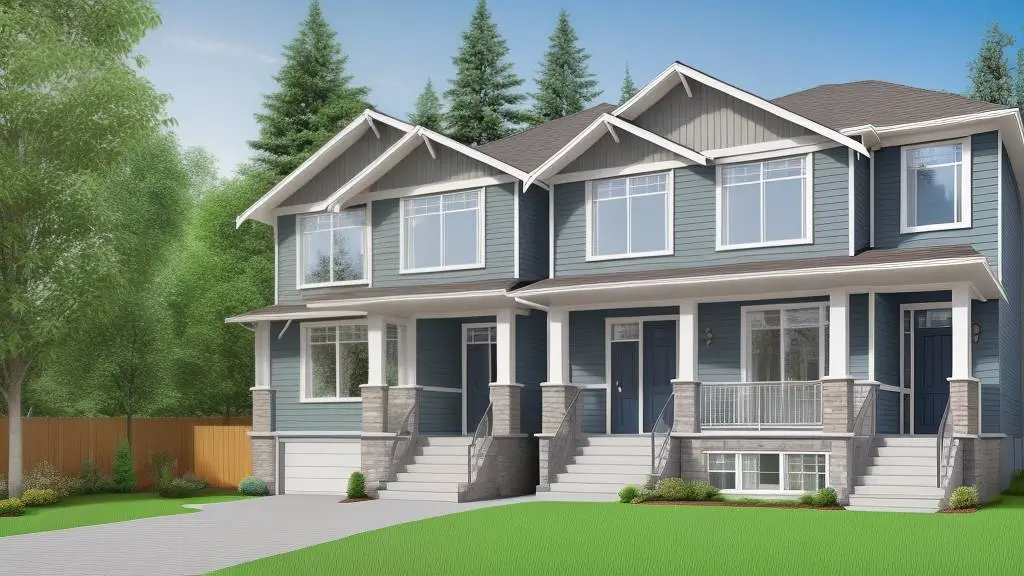Up To 6 Homes On Single-Family Lots Are Permitted By The BC Government At a Glance
The Government of British Columbia is implementing changes to allow for more low-rise, multi-family residential developments. These changes override municipal government control over zoning and aim to reform review and approval processes. The new policy, termed “small-scale, multi-unit” buildings, will apply to municipal jurisdictions with a population of over 5,000 residents. It allows for up to three units on single-family lots smaller than 280 sq metres and up to four units on larger lots. Lots in close proximity to public transit stops may permit up to six units.
Municipalities must update their zoning bylaws to enable this densification. The provincial government’s policy will catalyze an estimated 130,000 additional homes over the next decade. Public hearings for rezoning applications will be eliminated, and input from the public will be sought during the Official Community Plan public consultation process. The legislation does not apply to the City of Vancouver, which is working on reforming its own public hearing procedures. The government has set aside funds to support municipalities in meeting the new density requirements. Additional legislation to support transit-oriented development and other housing measures will be announced in the future.
The Details of Up To 6 Homes On Single-Family Lots
The Government of British Columbia is making big changes to allow more low-rise, multi-family homes to be built. They call these types of buildings “small-scale, multi-unit” buildings, like townhomes, multiplexes, and laneway homes.
This is part of a plan to give the provincial government more control over zoning and approval processes that cities currently handle. They first proposed this plan earlier this year, and now they are introducing the legislation.
The new policy for small-scale, multi-unit buildings on single-family lots will apply to cities with more than 5,000 residents, which includes most of the province.
For lots that are currently zoned for single-family or duplex homes, if the lot is smaller than 280 square meters (3,014 square feet), it can have up to three units. If the lot is bigger than 280 square meters, it can have up to four units.
For bigger lots that are close to public transit stops with frequent service, up to six units may be allowed.
Municipal governments will need to update their zoning bylaws to allow for this type of development in their single-family neighborhoods. Some cities like Vancouver and Victoria have already made their own rules to allow more units on single-family lots, and those rules will still be valid. However, cities covered by this legislation cannot have rules that allow for fewer units than what the province requires.
Premier David Eby said that the current zoning rules make it hard for people to find a place to live in the communities they love. They are not building enough small-scale, multi-unit homes that fit into existing neighborhoods and give people more housing options. That’s why they are taking action to fix the rules and build more homes for people.
BC Minister of Housing Ravi Kahlon added that this legislation will make communities stronger and help address the housing crisis.
By the end of 2023, the provincial government will release a policy manual with more information about the specific rules and requirements for building these types of homes. This will include things like how far the building needs to be from the property line and how tall it can be. It was also mentioned that there will be no minimum requirements for parking spaces if the property is within 400 meters of frequent public transit.
Municipal governments have until June 30, 2024, to update their rules. In September 2023, the City of Vancouver approved its own policy to allow up to six homes on a single-family lot.
It is estimated that this new policy could lead to the construction of 130,000 additional homes in small-scale, multi-unit buildings across BC over the next 10 years.
The legislation will also eliminate the need for public hearings for some rezoning applications. Instead, there will be more opportunities for the public to give their input during the process of updating the city’s long-term plan for development. This plan will now cover 20 years instead of just five, and it will have to include policies that encourage family-sized homes, rental homes, and affordable homes.
The government has set aside $51 million to help cities make the necessary changes, and $10 million for a program to support local governments with development approvals.
The new directives from the government will also help cities meet their targets for building new homes.
The government will announce more legislation before the end of 2023 to support development near public transit and other housing-related measures. They will also provide funding for infrastructure and amenities to support densification and population growth.
Vancouver Mayor Ken Sim said that the city is excited to support the province’s initiative to build more homes for people who need them. The city has already simplified its zoning rules and reduced the time it takes to approve permits to encourage more housing. This new legislation is another step in the right direction.

Summary
The Government of British Columbia is introducing legislation to enable more low-rise, multi-family residential developments, including townhomes, multiplexes, and laneway homes. The policy will apply to municipal jurisdictions with a population of over 5,000 residents and will require municipal governments to update their zoning bylaws to enable gentle densification in their single-family neighbourhoods. The legislation’s covered municipalities may choose to allow higher densities, but their bylaws cannot have fewer allowed units than what the province mandates. The legislation will also eliminate public hearings for site-by-site rezoning or spot-rezoning that align with the municipality’s Official Community Plan. The policy could catalyze 130,000 additional homes within new small-scale, multi-unit buildings across BC over the next 10 years.
The provincial government of British Columbia in Canada has announced new legislation that will require municipalities to allow for more small-scale, multi-unit housing developments in residential areas. Municipalities will need to update their Official Community Plans and zoning bylaws by the end of 2025 to meet the new density requirements. The government has set aside a $51 million fund to support municipalities with the required changes. The City of Vancouver, which operates under a separate charter, will not be subject to the proposed changes but is working with the provincial government on reforming its public hearing procedures. The government will also announce more legislation to support transit-oriented development and other housing-related measures before the end of 2023.

